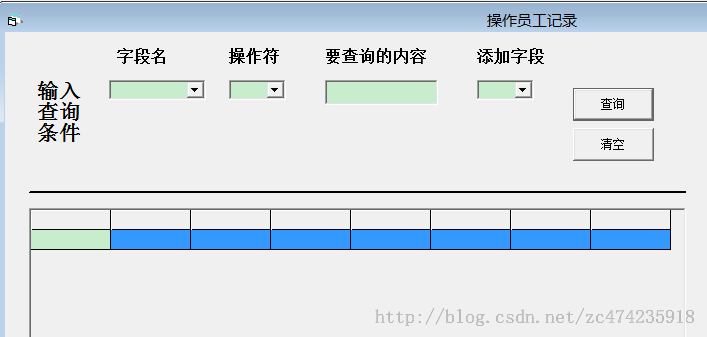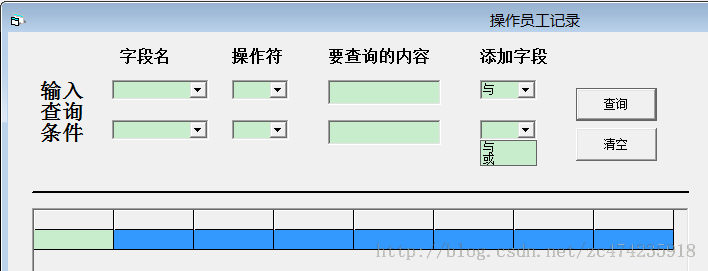机房收费系统---组合查询
在机房收费系统中,在对大型的数据中进行检索的时候。通过一个字段进行检索的时候,往往得到很多没有价值的结果。这样的查询没有多大意义。所以人们往往通过添加字段的方式。逐步进行筛选。这样得到的数据,又少又有用。
通过添加字段的形式来进行组合筛选。
默认是单个查询方式。
当使用的多的话,就可以通过添加字段的形式来进行组合查询。添加字段形式如下:
因为,在text中的文本与数据库中的字段名不一致,所以 这样的SQL语句达不到要求,所以需要把 text文本中的字段转换为 数据库中所使用的字段。
所以使用了tag属性:
Private Sub cboField1_Click() '把选择的字段转换成 sql语句中的字段
If cboField1.Text = "教师" Then cboField1.Tag = "UserId"
If cboField1.Text = "上机日期" Then cboField1.Tag = "loginDate"
If cboField1.Text = "上机时间" Then cboField1.Tag = "loginTime"
If cboField1.Text = "注销日期" Then cboField1.Tag = "logoutDate"
If cboField1.Text = "注销时间" Then cboField1.Tag = "logoutTime"
If cboField1.Text = "机器号" Then cboField1.Tag = "computer"
End Sub
Private Sub cboMode1_Click() '把选择的 字段 组合关系 转换成SQL中的 组合关系关键字
If cboMode1.Text = "与" Then cboMode1.Tag = "and"
If cboMode1.Text = "或" Then cboMode1.Tag = "or"
cboField2.Visible = True ’添加字段,打开一个新字段
cboSign2.Visible = True
txtInquire2.Visible = True
cboMode2.Visible = True
End Sub
在下述的查询中,依次向txtSQL中添加 sql语句,形成的SQL语句形式为:
select * from worklog_Info where (UserId='**' and loginDate='**' and ---) order by serial
然后依次添加检索字段如下:
Private Sub cmdInquire_Click()
Dim txtSQL As String
Dim MsgText As String
Dim mrc As ADODB.Recordset
'首先写一个不完全的SQL语句,一会儿补充
txtSQL = "select * from student_Info where (" & cboField1.Tag & cboSign1.Text & "'" & txtInquire1.Text & "'"
If cboMode1.Text <> "" Then '检验第二个组合字段的正确性
If cboField2.Text = "" Then
MsgBox "请选择字段名!", vbOKOnly + vbExclamation, "警告"
cboField2.SetFocus
Exit Sub
End If
If cboSign2.Text = "" Then
MsgBox "请输入操作符!", vbOKOnly + vbExclamation, "警告"
cboSign2.SetFocus
Exit Sub
End If
If txtInquire2.Text = "" Then
MsgBox "请输入要查询的内容", vbOKOnly + vbExclamation, "警告"
txtInquire2.SetFocus
Exit Sub
End If
'第二个组合字段正确,开始添加信息
txtSQL = txtSQL & " " & cboMode1.Tag & " " & cboField2.Tag & cboSign2.Text & "'" & txtInquire2.Text & "'"
End If
If cboMode2.Text <> "" Then '检验第三组 组合字段的正确性
If cboField3.Text = "" Then
MsgBox "请选择字段名!", vbOKOnly + vbExclamation, "警告"
cboField3.SetFocus
Exit Sub
End If
If cboSign3.Text = "" Then
MsgBox "请输入操作符!", vbOKOnly + vbExclamation, "警告"
cboSign3.SetFocus
Exit Sub
End If
If txtInquire3.Text = "" Then
MsgBox "请输入要查询的内容", vbOKOnly + vbExclamation, "警告"
txtInquire3.SetFocus
Exit Sub
End If
'第三个组合字段正确,开始添加信息
txtSQL = txtSQL & " " & cboMode2.Tag & " " & cboField3.Tag & cboSign3.Text & "'" & txtInquire3.Text & "'"
End If
txtSQL = txtSQL & ") " '把SQL语句补充完整
'Debug.Print txtSQL 用于调试程序使用
Set mrc = ExecuteSQL(txtSQL, MsgText)
If mrc.RecordCount = 0 Then '如果要查询的结果为空,则提醒用户
myFlexGrid.Clear
MsgBox "结果集为空!", vbOKOnly + vbExclamation, "警告"
Exit Sub
End If
With myFlexGrid '把标题写上
.Row = 0
.TextMatrix(.Row, 0) = "学号"
.TextMatrix(.Row, 1) = "姓名"
.TextMatrix(.Row, 2) = "卡号"
.TextMatrix(.Row, 3) = "余额"
.TextMatrix(.Row, 4) = "学院"
.TextMatrix(.Row, 5) = "专业"
.TextMatrix(.Row, 6) = "年级"
.TextMatrix(.Row, 7) = "班级"
.TextMatrix(.Row, 8) = "性别"
.TextMatrix(.Row, 9) = "状态"
.TextMatrix(.Row, 10) = "备注"
End With
myFlexGrid.Rows = mrc.RecordCount + 1 '设置大小
With myFlexGrid '对查询到的结果进行遍历,显示出来
.Row = 0
While mrc.EOF = False
.Row = .Row + 1
.TextMatrix(.Row, 0) = mrc.Fields(1)
.TextMatrix(.Row, 1) = mrc.Fields(2)
.TextMatrix(.Row, 2) = mrc.Fields(0)
.TextMatrix(.Row, 3) = mrc.Fields(8)
.TextMatrix(.Row, 4) = mrc.Fields(4)
.TextMatrix(.Row, 5) = mrc.Fields(5)
.TextMatrix(.Row, 6) = mrc.Fields(6)
.TextMatrix(.Row, 7) = mrc.Fields(7)
.TextMatrix(.Row, 8) = mrc.Fields(3)
.TextMatrix(.Row, 9) = mrc.Fields(11)
.TextMatrix(.Row, 10) =mrc.Fields(9)
mrc.MoveNext
Wend
End With
End Sub
如果是控件数据,可以通过for循环来减少代码量。
参考博客:http://blog.csdn.net/augus3344/article/details/11018455

